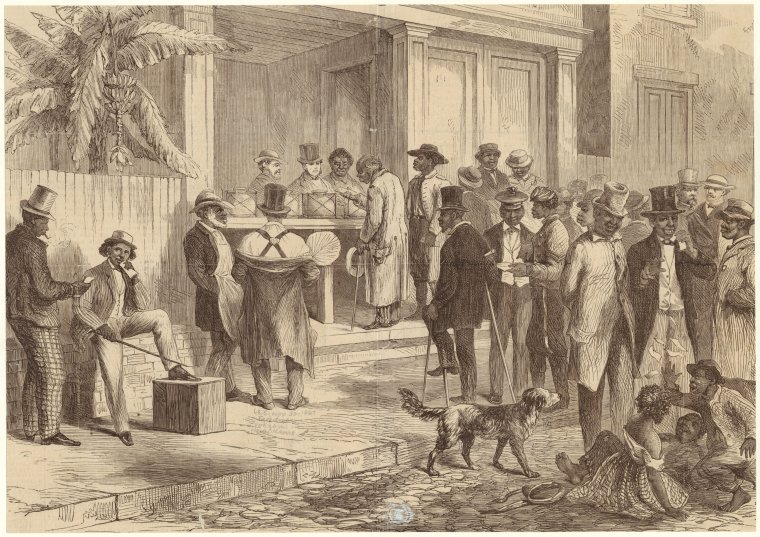There’s been pearl-clutching in odd quarters ever since Pastor Mark Burns, a South Carolinian, delivered his benediction on the Republican party. I am not a Republican and I won’t be voting for Trump, and I don’t think you should either. I am dismayed by the weaselly justifications some of my fellow Christians are spouting these days in their support for the GOP candidate.
Still, it amuses me that the professionally-impious are suddenly offended on our Lord’s behalf for what is, as I will show below, a fairly run-of-the-mill genre of prayer here in the South. We’ll fisk the prayer, using the transcript from Think Progress, and chat about Southern culture and the state of the Union in the process.
First, let’s talk about the South.
***
The other week a homeschool mom asked in a discussion group for advice on which neighborhoods in her new city we other Catholic homeschoolers recommended. An animated discussion ensued. Residents each touted the benefits of their own part of the metro area. There was nothing we could do to help, really, until we knew the poor woman better: The various neighborhoods each represented some five or six completely distinct Southern sub-cultures, and that’s just among white people, and just in one particular city.
If you want a food metaphor, the South is a heaped up plate from the all-you-can-eat BBQ buffet, assorted cooking juices running together, and no we don’t want the sauce they use where you come from.
If you want a historical perspective, imagine for a moment the diversity of dialect and class and regional culture of the British Isles. Now imagine that the problem children of all those different places decided to strike camp and go open up their own country, only someplace where the soil is anemic and the mosquitoes are vigorous.
If the prospect of Downton Abbey meets Lord of the Flies appeals to you, you’ll fit in just fine.
***
I know nothing of Pastor Mark Burns, but I recognized his prayer. Southern Evangelical culture has its own prayer forms, and he was sticking to form. His critics, in letting themselves get distracted by what is essentially genre-poetry, have missed the message.
We’ll go line by line and parse out what’s there for the educated reader. Again, we’re working from the transcript at Think Progress:
Hello Republicans! I’m Pastor Mark Burns from the great state of South Carolina! I’m going to pray and I’m going to give the benediction.
If you want a group of Catholics to pray, the best thing to do is raise your hand to your forehead and loudly and forcibly intone In the name of the Father . . .. It’s pretty usual for Evangelicals to open with some front matter before they launch into the prayer itself.
And you know why? Because we are electing a man in Donald Trump who believes in the name of Jesus Christ.
I will err on the side of charity in not quibbling with that assertion (please vote third party this fall). The cultural point to note is that Southerners don’t feel obliged to shuffle their feet and mumble, “Aw, shucks,” about their faith. What seems like brazen self-promotion to an outsider is just a simple statement of fact. Because our faith is integral to who we are and everything we do, mentioning it at a major life moment is par for the course.
And Republicans, we got to be united because our enemy is not other Republicans — but is Hillary Clinton and the Democratic Party.
People are really upset that the pastor would say this. Well, it’s not something about the South, other than that the man is willing to say it openly and not feel the need to act all neutral and diplomatic. This is something about America, and also something about the people Pastor Burns represents, and it’s just a fact: What Hillary Clinton stands for is in opposition to nearly everything that the Trump-Burns people stand for (pork barreling and corporate favoritism aside).
Hillary Clinton’s policy goals are completely contrary to the social and political and philosophical priorities of, say, the average South Carolina voter who will almost certainly vote for Trump (though I wish they wouldn’t). So yes, she’s an enemy. She and her political fellows are quite open about their willingness to force their goals on the unwilling. If that’s not inimical, I’m not sure what is.
Now the prayer starts:
Let’s pray together. Father God, in the name of Jesus, Lord we’re so thankful for the life of Donald Trump.
This is formula. You open a prayer by giving thanks for the person, place, or thing that you are praying about. When I open a class in this genre of prayer, it almost always begins, “Thank you Lord for gathering us here today, for each and every one of us that you have brought together in the class . . .” or some similar thing. It’s the default opening in this literary form.
If your sanctity is up to it, you’d do the same if you were praying for Barack Obama, though probably with a pointed observation that what you’re truly thankful for is God’s Sovereign and Inscrutable Will. (Unless, of course, you could stand the man.)
We’re thankful that you are guiding him, the you are giving him the words to unite this party, this country,
This part upsets people. The false inference is that we’re setting up Trump as God’s Annointed in some particular, almost Christological way. There are two much more likely inferences to be made:
- Trump’s leadership of the party is being recognized as something God has in fact allowed, per the Biblical injunction to pray for those whom God has set upon the throne.
Since Burns is a Trump-supporter, this might not be quite what he was going for. More likely:
- He is holding to the opinion that everything a Christian does is part of answering our vocations. Whether it’s the time we wake up in the morning, or what we eat for dinner, or what job we do and how well we do it, it’s a commonplace of Christian spiritually that we ought to strive to do everything with God and for God.
The reference to uniting the party and the country is probably aspirational.
. . . that we together can defeat the liberal Democratic Party,
This is what the Republican Party is hoping to do this fall. In Evangelical culture, humility is not expressed by pretending at indifference. You just tell God what you want, done. That’s how you pray. It would be considered affected, in the worst kind of way, to fake like you really didn’t care what God did when in fact you were asking God to answer a specific request.
. . . to keep us divided and not united.
Evidence that the reference to Trump uniting the party was clearly a hope and not an established fact. Evangelicals aren’t afraid to boldly approach the Throne of Grace and ask for miracles.
Because we are the United States of America, and we are the conservative party under God.
Slight nuance here, in that, unlike above with respect to Trump’s leadership, here the prayer is talking more about how the petitioner sees himself and those he represents.
This is very typical in this genre of prayer. If you were praying for a job, you might include mention of how you are working hard to support your family. If you were praying for help on an exam, you might include mention of how you are striving to be a good student, or trying to improve your lot in life, or trying to get your parents off your back for once.
It’s not hubris in this genre, it’s childlike petition to the Heavenly Father, and picks up on the same things kids say when asking for things. (“We’ve been good all day long, and cleaned our room, can we please have ice cream . . ..”) In this literary form, the self-identification can be affirming or contrite. (“I know I don’t deserve it, but . . ..”)
It is unsurprising that men like Donald Trump and Mark Burns show a surfeit of confidence here. They didn’t get where they are now by wallowing in self-doubt.
To defeat every attack that comes against us, to protect the life of Donald Trump, give him the words, give him the space, give him the power and the authority to be the next President of the United States of America,
And again, we conclude by naming the specific requests. Outsiders can wrongly infer that Pastor Burns is committing the sin of pride in the worst kind of way. Quite the the contrary: This series of petitions is specifically acknowledging the need for, and thus requesting, divine assistance.
Burns and Trump might be the most conceited, pride-ridden men you ever met (or not), but the form of the prayer is just how you ask for things in this genre. If I ask Evangelical friends to pray for my health, or that I wouldn’t yell at my kids, or that the stupid fire ants would notice I put Amdro out and leave my house alone, they’ll likely include invocations of this sort.
[Pause now and try it, if you like. Thanks. I really want those ants gone before my kids’ birthday party on Saturday.]
in Jesus’ name
Evangelicals usually invoke just the name of Jesus rather than the Holy Trinity by title. There’s no particular theological implication in that difference, it’s mostly just customary.
Evangelicals place great importance (rightly) on a willingness to boldly proclaim the faith in all circumstances. Unlike more diplomatic-folk, Evangelicals generally won’t bat an eye at invoking the Holy Name in a mixed-faith audience. If you didn’t want a Christian prayer, why’d you ask a Christian to pray it? It’s not like it’s any mystery what the good pastor’s theological predilections are.
— if you believe it, shout Amen!
And finally, a boisterously-expressed faith is not considered (necessarily) showmanship. To understand this, imagine your utter confusion if you saw some ordinary Catholic genuflect upon entering the pew, then kneel to pray in silence, and a bystander accused that person of “showing off” or being “holier than thou” because of those actions.
It’s just what people in that Christian subculture do. Evangelicals consider the call for a rousing vocal assent to a prayer to be no more inherently prideful than Catholics closing a prayer with the Sign of the Cross.
What New Thing Can We Learn from This Prayer?
The chief lesson to be gleaned from this prayer is the one you’ve probably already learned on Facebook: Christians are throwing in their lot with Trump.
I wish they wouldn’t, but given the extent to which fidelity to the GOP has seeped into Christian culture over the past fifty years or so, it’s not a surprise so much as one more gut-wrenching disappointment. No matter how distinctive our way of expressing it, American Christians, whether Catholic or Evangelical, have pretty much sopped up the values of the wider culture.
We aren’t a people who stand apart in our city on a hill. We’re not just in the world, we’re very firmly of it.
Be mortified. Pray, fast, beg for mercy.
Artwork: Fresco of the north dome at the library of Altenburg Abbey (Lower Austria) by Paul Troger (1742): Theology and Jurisprudence, photo by Uoaei1 (Own work) [CC BY-SA 4.0 (http://creativecommons.org/licenses/by-sa/4.0)], via Wikimedia Commons.





















